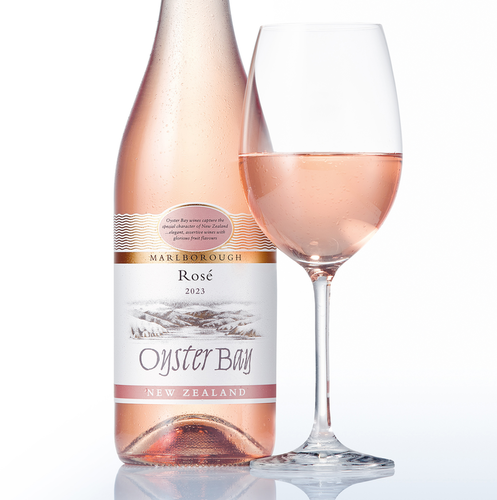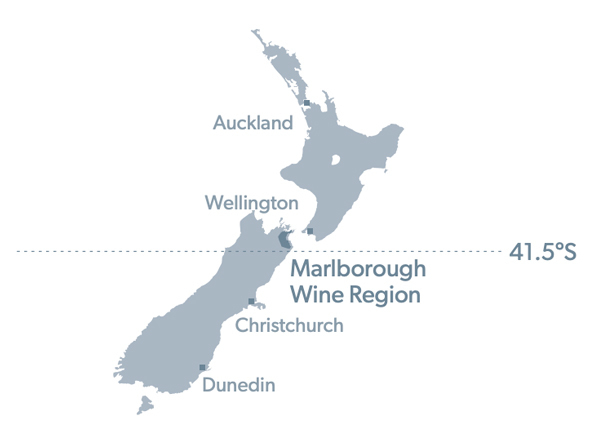
2023 Rosé
Oyster Bay
Marlborough Rosé
Fragrant summer blossom and red berryfruits, with wonderfully refreshing citrus notes and an elegant texture.
The philosophy of Oyster Bay is to produce fine, distinctively regional wines that are elegant and assertive with glorious fruit flavours. Oyster Bay Rosé is made from premium Pinot Noir clones, carefully selected and blended to express fruit vibrancy and delicate red berry profiles.
At harvest, we look for fragrance, elegance and refreshing natural zest profiles in the fruit, altogether bringing dimension and softness. Our winemaking accentuates the aromatics in the fruit, creating a style that is pale rose in colour but vivid in its flavours of strawberry and red berry fruits, with aromas of summer florals.
New Zealand is blessed with two natural attributes that enable it to produce Super Premium wines unlike anywhere else: a maritime cool climate and alluvial soils.
New Zealand’s position in the Pacific Ocean provides a unique, temperate maritime climate. The benefit of a cool climate with long sunshine hours is an extended growing season with a long, slow period of ripening. This allows the well ripened grapes to develop strong, intense varietal characteristics whilst maintaining a balanced, crisp, natural acidity. Over thousands of years the continual process of mountain building and erosion by glaciers, floods and wind, has deposited alluvial soils on the riverbeds and terraces throughout much of New Zealand. These are the soils in which the vines of New Zealand’s renowned wine regions grow unique, quality grapes.
Marlborough Growing Region
The Marlborough region located at the top of New Zealand’s South Island provides a dry, sunny, but temperate climate, which allows the grapes a long, slow period of ripening spanning from January to April. The clear, cold nights keep acid levels high in the grapes, even when their sugars are rising. These day/night temperature variations are a crucial climatic influence that retains the grapes’ crisp, fresh, vibrant fruit characters.
Marlborough Soil Type
Brancott and Renwick soils – Pinot Noir is particularly site-specific and responds best to these uniform, moderately fertile, silt overlaying clay loams, with moderate water-holding capacity.
Clonal / Rootstock Selection
A range of clones and rootstocks that best suit each vineyard block are selected to deliver concentrated fruit flavours.
Winemaking Techniques
Pinot Noir grapes were vinified to deliver fruit aromatics and vibrancy. The grapes were destemmed and gently crushed. The juice was clarified and racked in to stainless steel fermentation tanks. It was then inoculated with a selection of yeasts, chosen specifically to heighten the aromatic potential of the wine. A slow, temperature controlled fermentation at 13– 16°C (55–61°F) was undertaken for approximately 14–16 days. The wine was given a short period of yeast lees contact without stirring, imparting a delicate texture. No malolactic fermentation was undertaken. The wine was racked for final blending and bottled young to retain the refreshing, lively fruit characters.
Sustainable Winegrowing
As a founding member of Sustainable Winegrowing New Zealand, we are conscious of our environment and we work hard to identify sensitive areas such as wetlands, streams and native vegetation to ensure that our vineyard practices do not affect the plants and animals that inhabit these areas. We minimise our water usage through our state-of-the-art soil moisture probe technology. We look after our soils by having interrow ground cover plantings, and by spreading our mulch underneath our vines, to provide a botanically diverse ground which encourages beneficial insects into our vineyards.

2023 Marlborough Vintage:
Vintage 2022 delivered hallmark Marlborough aromatics, flavours and refreshing acidity. A true showcase of Marlborough’s famed cool climate viticulture.
| Vineyard Locations: | Wairau Valley, Marlborough |
| Vine age: | 6 - 25 years |
| Harvest Date: | 16 March – 25 March 2023 |
Maturity Analysis at Harvest (weighted average)
| Brix: | 22.2 |
| Titratable Acidity: | 8.6g/L |
| pH: | 3.43 |
Wine Analysis
| Alcohol: | 12.5% v/v |
| Residual Sugar: | 3g/L |
| Titratable Acidity: | 6g/L |
| pH: | 3.4 |

